#i'm reading rebecca
Explore tagged Tumblr posts
Text
the writing is so good but this book is taking me a while to get through bc i hate this husband like girl RUN
#novelblogging#i'm reading rebecca#i think we are supposed to be thinking that but it's still painful D:
3 notes
·
View notes
Text
hi i brought some memes based on fourth wing
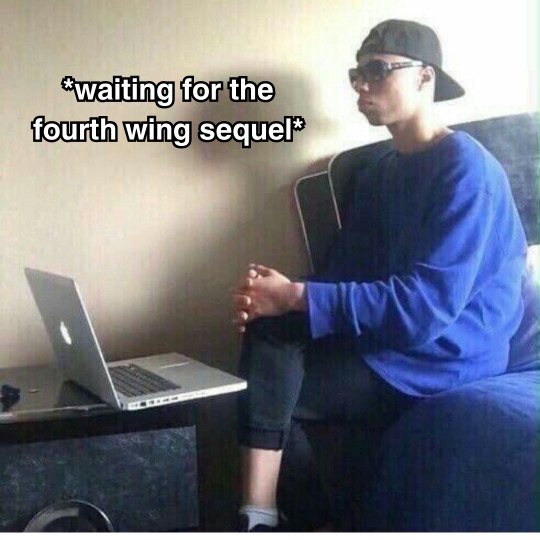

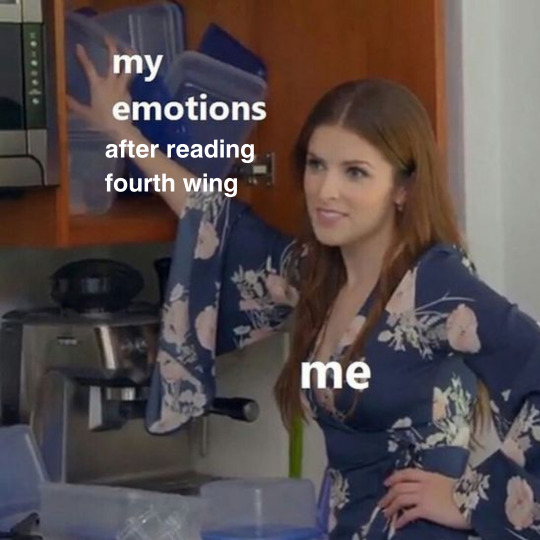
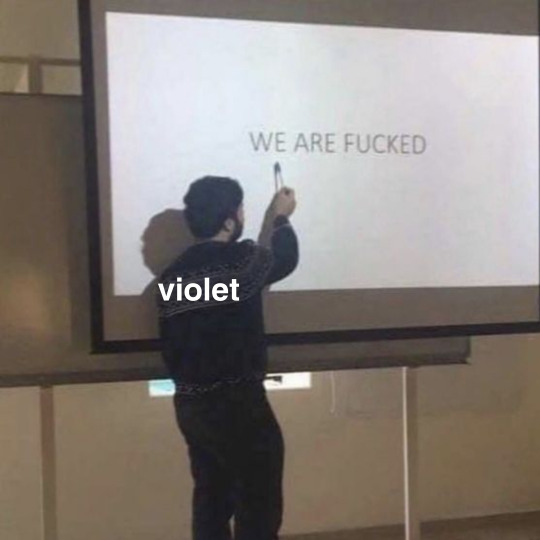

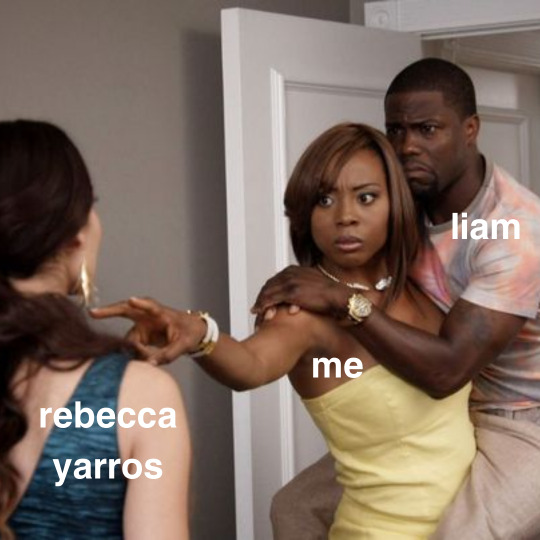
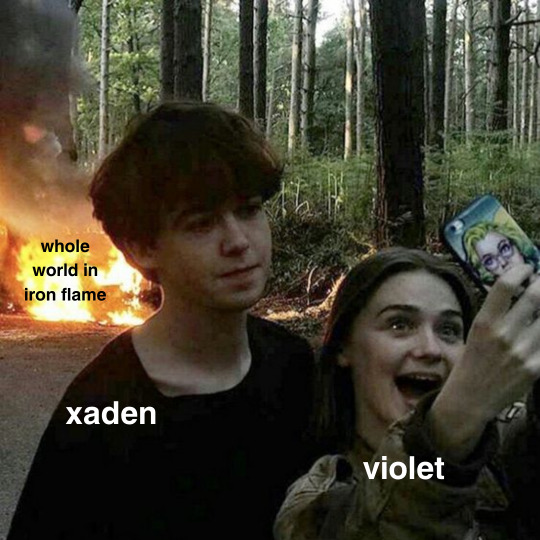
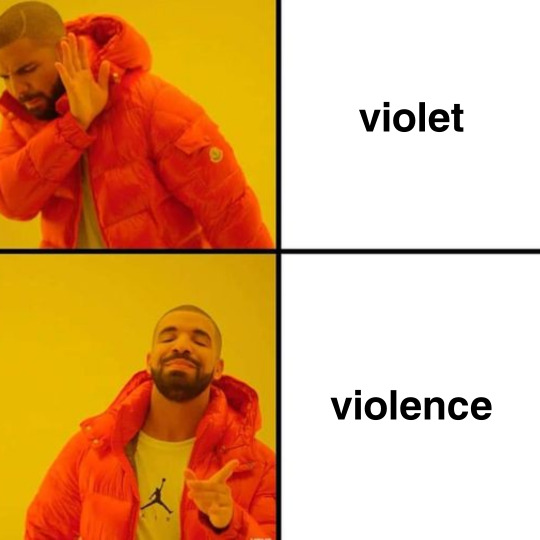
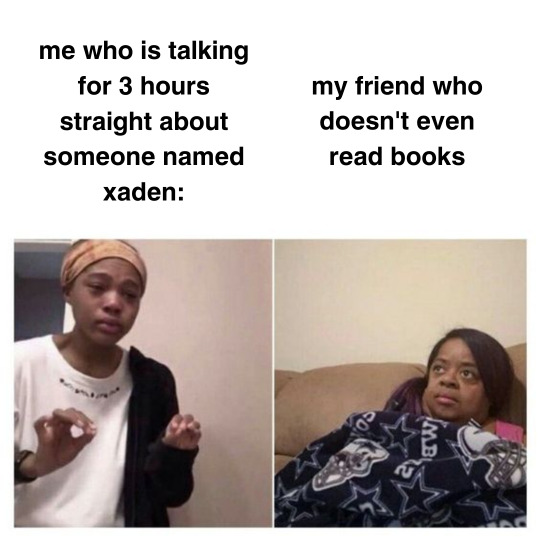

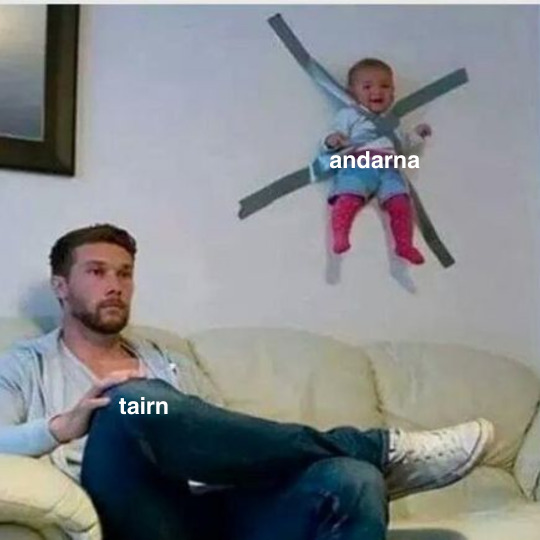




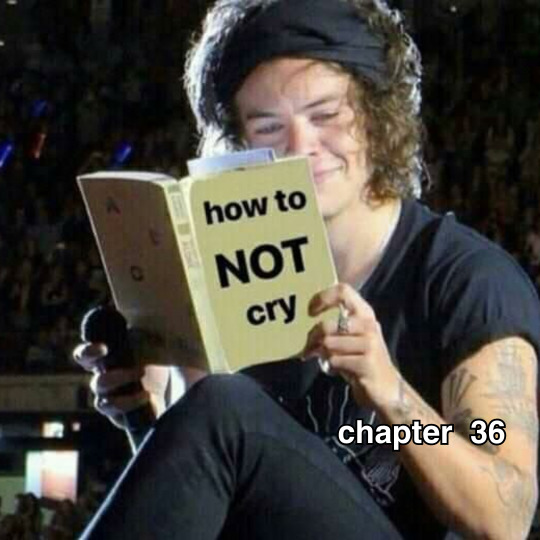
and i also created a playlist:
#thank you for your attention#now we can continue to suffer in waiting for the second book#this is the first book that made me make memes#i'm no good at it#but i've tried.#fourth wing#xaden riorson#xadenviolet#violet sorrengail#violet and xaden#rebecca yarros#tairn#andarna#books and reading#Spotify
6K notes
·
View notes
Text
Honestly if anyone -especially Rebecca- told my more cynical detective that A and her seemed similar to Rebecca and Rook, because of the similarities between Rebecca and A, she'd laugh in their face. For many, many reasons, it's different, but most of all - Rebecca and A put distance between the detective and themselves in two very different ways.
Rebecca says she cares, but hardly ever shows it. Whereas A says they don't care, but they always, always show it.
The detective knows which one she prefers.
#To be clear I'm not saying Rebecca doesn't care for the mc#It's just that this particular MC struggles to see it#And frankly the narrative itself flip flops on how much attention (and of what kind) Rebecca gave the MC#So this is with respect to the most critical reading you could take of Rebecca#I have another MC who has a much more loving relationship with the most uncritical take of Rebecca#adam du mortain#ava du mortain#a du mortain#the wayhaven chronicles#twc#twc rebecca
66 notes
·
View notes
Text
Me: I want to talk about Louis de Pointe du Lac in the books and how he's constantly haunting the narrative whenever Lestat is the narrator, even when he's not physically present or Lestat isn't even consciously thinking of him, because Lestat is actually always thinking of him and remembering him and using him as his humanity compass, and...
The tiny rational part of me: can you PLEASE go to bed, you'll write a love letter to Louis once you've had more than 4 hours of sleep, I am begging you, your eyes are burning, your neck is aching, you're starting to get a headache and you're being slightly delirious.
Me: but Louis.
Rational me: LATER.
Anyway I love Louis and I love how Lestat completely adores Louis and I love how every single vampire of the Court, from the most ancients to the youngests, know that they belong together and no one should ever try to separate them.
Also Louis noping out of the entire drama with Amel and those clone guys to go peacefully read in his crypt far away from the entire drama is so FUNNY AND RELATABLE, like same mate, saaaame, I'm good reading about it, don't wanna live it, no thanks.
#rapha talks#rapha reads#the vampire chronicles#prince lestat#prince lestat and the realms of atlantis#louis de pointe du lac#lestat de lioncourt#loustat#anne rice#books#i swear louis is the only vampire with brains in this entire world#homeboy definitely understood early one that he should only deal with his own business and stay away from the insanity#or should i say he went insane in the 70s and kick-started an entire societal revolution and he didn't like that one bit#so now he'd rather be left alone to his own device and honestly he's so right#his only flaw is that he's entirely devoted to lestat but like. who can blame him.#but yeah he's the ghost he's rebecca haunting the manor and guiding the story even when he's not there#no wonder anne rice identified herself as being him or him being her i understand i understaaaaaand#oh man can someone take me out please#my mind does not want to shut up i'm tired of myself#anyway#i love louis#that's it that's the post
46 notes
·
View notes
Text
reading fevered star by rebecca roanhorse and i need to lie down and recover from the fact that serapio was supposed to die after fulfilling his destiny but the crows that he had befriended loved him enough to sacrifice their lives for his and bring him back
#he was supposed to be only a tool of vengeance! and even the people who raised him were okay with sending him to his death!#but the crows loved him!!! i'm emo!!#what a blorbo of all time tbh#pie says stuff#pie reads#fevered star#rebecca roanhorse#between earth and sky#serapio#books
21 notes
·
View notes
Text
To the illiterate people with 0 reading comprehension that I have seen on tik tok today claiming that Maven deserved Mare, that it was stupid and "unfair" that he didn't get her, and that clearly with his trauma and what his mother did to him he deserved her:
I would just like to issue a sincere Fuck You to you and any future illiterate children you produce.
#red queen#glass sword#kings cage#war storm#it took so so much will power not to ANNIHILATE them#I swear#books like SJM and rebecca Yarrow and others like them are PROMOTING THIS BULLSHIT THINKING#I am going to scream#I literally cannot be apart of the reading community anymore if these are the thoughts people are having#this is utterly ridiculous#tell me you didn't pay attention in middle school english class without telling me#tell me you lack reading comprehension without telling me#tell me you lack basic human brain power without telling me#i'm old and I am angry#this is just ridiculous now#must we cycle though the same stupid rhetoric over and over again?#dear lord#If I hear one more person say he “deserved” her#I'm going to push them in front of a bus
52 notes
·
View notes
Text

and here we're introduced to nack the weasel, back when he was still called nack the weasel
#for convenience purposes i'm tagging him as nack the weasel here#sonic the hedgehog#archie sonic#sonic triple trouble special#nack the weasel#rebecca reads archie sonic
11 notes
·
View notes
Text
Drop whatever you're doing and go read one of the best new adult fantasy romance books of this year: Fourth Wing by Rebecca Yarros
214 notes
·
View notes
Text
The Failure of Ted Lasso's Unconventional Politics
SOCIAL CONDITIONING:
According to Brendan Hunt, shippers interested in a second chance, mature-age romance between Ted and Rebecca were being blindly, un-self-reflexively led about by their “social conditioning”. Presumably, however, the writers who wrote Ted returning to his heteronormative family unit – as well as all the viewers who enjoyed this ending and have defended it since – are completely free of social conditioning? No social conditioning is involved in reifying the white heterosexual family unit? No social conditioning is involved in deifying parenthood, fatherhood and patriarchy at the cost of all else? There is no social conditioning involved in a conclusion that values good ole working class Americana while rejecting the big, queer, complicated, multicultural world?
KISS (Keep It Simple Stupid):
If the creators wanted to gesture to “Cheers” as a classic American sitcom, then at least learn from its example. This show worked best when it worked with familiar, beloved characters in a familiar, beloved, but confined setting. "Ted Lasso" had a near-perfect first act, doing a simple thing well. But from s2 onward, the show started straying out of bounds. The cast of characters kept expanding and contracting: people were in, people were out, characters were coming and going and changing (what was the point of that whole Zava plotline?). We had multiple workplaces and workplace dramas (grew to like Barbara tho). Episodes got long and unwieldy. Themes got convoluted as the show took a long trip, imo, up its own arse. The folksy wisdom of s1 became grating self-indulgence and cliched “moment” manufacturing.
SUPERFICIAL UNCONVENTIONALITY:
TL employed a familiar 3-part structure but ultimately its supposedly radical, unconventional politics was not reflected in the show’s structure. Since the first act started with Ted's arrival, you could see his departure coming from a mile off. Some folks are acting like returning Ted home constitutes some super brave move by the writers that we've never seen before. But if you want to talk social conditioning expressed through narrative expectation then you really couldn't get anything more conventional than this ending.
We've seen it all before:
Act I: Fish-out-of-Water character arrives and begins winning over a dubious, dysfunctional community Act II: Bonding, hijinks, missteps, complications and development Act III: Revelations of growth. Community sadly waves goodbye to teacher they love but no longer need. Cue credits with moving song choice.
It's as cliche, conventional and predictable as it gets. And I could condescendingly accuse every viewer who enjoyed this ending as being blindly and un-self-reflexively led around by their social conditioning. But even if I'm not one of the showrunners who also played a beloved character and who is speaking on a public forum, that would be a pretty fucking shitty move. What I am saying is that the disagreement over this ending speaks to some core ideological differences currently playing out across the globe around patriarchy, feminism, queerness and privilege. There is an opportunity here to examine what we socioculturally view as “good’ and “right” and “happy”. These ideas of good, right and happy are not necessarily benign and will be inevitably reflected in and reproduced by our art.
PATRIARCHY:
In the end, “Ted Lasso” literally chose patriarchy (but what kind is the question). Just because this show was working with a familiar 3-part structure, that doesn't mean it didn't need to justify Ted's inevitable departure. For many people, his son is enough. That's it. End of conversation. Henry trumps all. And yes, this was always going to be the justification used by the series. But I think this disagreement highlights changing attitudes to modern parenting. Everyone agrees that parenting requires sacrifice: large and small, everyday and lifelong. But how much sacrifice is too much?
For some people, this was too much sacrifice. Others seem to think it was Ted's duty to sacrifice for his son his own sense of family and community, his continued health and growth, his professional fulfilment. Imo, he could have shared all of this with him but chose old-school parental sacrifice instead. I consider this kind of sacrifice to be something that culturally we’re coming to recognise as unhealthy, for both parent and child. In reality, parents are more than one thing. Parents have jobs, interests, relationships, needs, limitations and struggles. Parents are people.
In the series, Ted was established as a person: a person with a sad past, a tortured inner world, a strong desire to connect with others and, potentially, a brighter future than his past. From the beginning, his relationship with Michelle was established (and often reinforced) as over, dead, absolutely no route back in. But his relationship with his son was loving and important to him. Of course it was. He’d be a bad man and unlikeable character if it wasn’t. Even so, Henry isn’t a major or fully realised character in this show. We care about him, relate to him through Ted. He matters to us because he matters to Ted. But frankly, we are far more attached to Ted’s other adopted “children”, the relationships we have watched him develop over 3 years, than the relationship we only saw glimpses of. That’s just narrative reality. In reality, yes, Henry would and should be Ted’s first priority. This is only right. In fiction, the team at Richmond should have been the first priority of Jason and the rest of the writing team. They are the ones we want to see and want to see happy and settled.
As many frustrated viewers have stated, it's not Ted's departure that is so disheartening but how it was done. If the TL team wanted to make this choice seem like a healthy one for Ted then they needed to establish other things waiting for him in Kansas: friends, community, employment, fulfillment. As it was, literally nothing tipped the scales in favour of Kansas. There were no romantic, community or larger familial relationships to get back to. Far too much was just left to inference or imagination. Yes, we can assume that Ted has community in Kansas, that he will probably get a great job after his success in Richmond. But all the people and opportunities we would like to infer/imagine will never tip the balance towards Kansas when we consider all we KNOW is already established for him in Richmond. The homeworld and beloved characters of a show will always hold more emotional weight than anything undefined and hypothetical. If viewers were to be happy with Ted’s exit then the writers needed to take the time to lovingly define his future away from the club.
Instead, it seems like a deliberate choice to shut Ted down and perform (and I do mean “perform”) this marvelous sacrifice for his son that so many think is admirable. It’s this shutdown that is so inconsistent and confusing. Because at any time in the hour, Ted could have said to Rebecca, the Diamond Dogs and/or his team:
“Look y'all this ain't the end. We’re family now. I'll be back. I'll show y'all round Kansas anytime you wanna visit. My mom will cook a dinner that will clog your arteries. And every so often, what say we do a long-distance movie night, huh? I'll miss you all but I’ll be watching every game and I can't wait to come back and see you win the whole fucking thing!!”
Ted could have been a model of honest, expressive, emotionally forthcoming, relationship-maintaining masculinity. But nope. Not a word. Just brave male sacrifice. It's straight up patriarchal propaganda. And truth is, fathers sacrifice way less than mothers do in heterosexual parenting relationships. Mothers are generally the ones making those small, everyday sacrifices that our society rarely acknowledges or admires. But I bet this ending makes all those lazy husbands and boyfriends feel real good about themselves. I bet it makes many female partners feel all warm and fuzzy to know that even though their kids’ father won't share half the labour that goes into raising a child, when it comes time for him to perform a massive manly sacrifice for his family, he toootttaaally will. I'm sorry, what were you saying about social conditioning Mr. Hunt?
FATHER GOD or WHITE SAVIOUR?:
Patriarchy needs its Father Gods and its Mother Gods to play certain roles (tho, to paraphrase Angela Carter, both are as silly as each other.) These magical figures materialise at pivotal times then dematerialise when the narrative is over, the pivotal lessons learned. They never themselves learn or alter. Think Mary Poppins or Nanny McPhee. These figures are not entirely human, they possess an element of the supernatural. They serve others, serve a higher purpose. Nanny McPhee's appearance changes only as a reflection of her charges’ growth. Mary Poppins – the figure to whom Ted is most likened – learns to care about her kids but she doesn't engage in any self-introspection. Her duty and trajectory remains unchanged. When she arrives at her next job, she will do so exactly the same as she was.
These otherworldly mother deities are not unproblematic feminist figures themselves. But creating a male, fatherhood deity becomes even more problematic when he is white, cis-het and pretty able. Ted arrives to teach all the black and brown lost boys, to unite the disconnected women, liberate the closeted gays and to update the bumbling English gentlemen (there is, I feel, a special relish in these American bros educating their former colonisers on modern manhood). Here, we start to stray into white saviour territory. Frighteningly, this kind of patriarchal demi-god implies that white men are the most progressive figures in a society, they are in the political vanguard, championing the needs of the disconnected and downtrodden. White men are the ultimate source of wisdom, kindness and progress. It represents them as a group as progressive, when in reality the attitudes and politics of this group represent conservative politics and regressive values that impede the progress of every other marginalised group. If we buy this myth about white men, then we are more likely to accept what they say to us from their positions of power and privilege as right, wise, kind and progressive, even when it is the opposite.
So, if you are going to put forward a white man as a model of progressive politics, then you need to embrace unconventionality, not just superficially but down to your bones. “Ted Lasso” tried to structure s2 and s3 differently but just ended up making a mess of allusions and ideologies that did not connect, cohere, develop or conclude. In fact, sometimes they straight-up contradicted. Employing a magical 3-part structure and making a bunch of meaningless allusions to well-known classics does not another classic make. They did not engage with any of these classics (“Cheers”, “Mary Poppins”, “The Wizard of Oz”) in any deep or critical way. Classics may be loved but they are not faultless. If you simply repeat what has already been done, even in celebrated classics, you may just end up repeating mistakes someone already made for you to learn from. TL repeats the central feminist problem of parental deities in “Mary Poppins”, just as it repeats the irreconcilable ending of “The Wizard of Oz”.
LIMINALITY:
Both “The Wizard of Oz” and “Mary Poppins” take us into strange liminal worlds. “Ted Lasso” could be read similarly, except that Ted doesn't take any magic home with him. In fact, he seems to actively forget it, reverting to the Ted he was before leaving. No queerness or feminism follows him home, no traces of the various cultures he's come into contact with. The liminal remain liminal with no indication that these two worlds will communicate or can integrate. The non-white, female, queer and otherwise bizarre are left outside of Ted’s squeaky clean hometown heteronormativity. And I really don’t think I have to explain why that is so deeply irresponsible. Because again, this is a writing choice.
That epilogue at the end was brief but imagine if it included more detail: Ted texting with Rebecca, or facetiming with Roy, Jamie giving Henry advice. They didn't take the time to honour and continue these relationships or integrate these two worlds. They didn't suggest that responsible fatherhood could entail many things, could look different. “Sacrifice,” they said profoundly. “Fatherhood,” they murmured mistily. “Patriarchy” was their final word to which this feminist says, “Bullshit.”
PRIVILEGE:
I only did one film unit at uni but it really doesn't take much to deconstruct the absurdly inconsistent ending of “The Wizard of Oz”. It was 1939, the end of the Great Depression and the start of another devastating world war. People needed to be convinced that their small ramshackle b/w lives surrounded by loved ones were stable, noble even. They already had everything they needed. They didn't need Oz. They didn't need bright futures, big adventures or exciting opportunities. Monochrome Kansas was all a good American should ever hope for. There was danger in difference, safety at home.
Well, here we are in late-stage capitalistic hell, having come through (???) a pandemic and it takes a special sort of privilege to say to an audience: you don't need money or opportunity or community, they won't make your life any better than before. Be happy with the muddy and mundane. Be happy with what you've got. Turn away from larger community, greater knowledge, continued stability, and isolate yourself in a bubble of you and yours. Look, it's not a sweet or familiar narrative conclusion but the truth is, Ted’s, Henry’s and Michelle’s lives would have all been better if they'd relocated to London. Do these dolts have any idea what teachers (in the USA esp) are currently going through? How overworked and underpaid and undervalued these people are? The burnout rates?? Ted didn't have to take the highest salary Rebecca offered but, had the writers been willing to put in the effort, a more unconventional, more modern ending to this series could have been crafted.
Not that I'm surprised they took the easy road to glory. All indications from the beginning of s3 suggested that this would be the rather predictable conclusion. Indications do not, however, constitute development. This team had the opportunity to write a new ending to an old story, one that incorporated queer, feminist and anti-capitalist values. One that defined a different, new version of patriarchy. They didn't even think to. In their white boi hubris, they just assumed that they and tradition knew best. Considering how many viewers would be struggling right now for food, housing, employment and opportunity, an ending in which Ted turns down an opportunity like this hits a false, rather virtue-signally note. Literally, nobody would have come out worse. Everybody would have benefitted from Ted staying in Richmond. Which means this decision was made purely to manufacture a “moment” that celebrates patriarchy.
ANTICAPITALISM: There’s a reason they had Rebecca offer Ted the biggest salary in his industry. They wanted to make it NotAboutTheMoney! Ted doesn’t say so (doesn’t say anything) but, because this narrative idea is so fucking familiar, we can assume the thoughts behind his oh-so-sage expression are: “Well, shucks now, boss, I rightly do appreciate the kindly offer but that there kid o’ mine is more important to me than any cash you could put in my silly lil handy-hands.” Good Lord. The cringe is real. I really, really can’t with this mighty, manly silence and sacrifice. My problem isn’t that Ted values his son over money (not that it has to be a choice because that money could benefit Henry and his mother, who is owed a heck of a lot of child support esp since she’s been raising their son solo for 3 years). Again, that is how it should be. My problem is that the show actively established Richmond as an anticapitalist landscape, then suddenly at the eleventh hour, tried to walk that back and imply it was actually a capitalistic landscape (in contrast to homey ole Kansas).
Capitalism teaches us to sniff at money. We've been told by the monied and privileged that it won't buy happiness. (This is of course, utter bullshit because money can buy you a hell of a lot of wellbeing, security and opportunity). At the beginning of the series, Rebecca Welton stands for this principle. And by the end, she has found a way to use her extreme wealth and privilege in an ethical way. She gives it away. She supports others. She lets Sam out of a promotional contract, she funds Keeley’s business, she sells half the club to fans. The most obvious example of Rebecca’s anticapitalist politics is her confrontation with all the richy riches who want to take soccer away from the people. Here, she becomes an anticapitalist leader, one who has been positively influenced by the anticapitalistic politics of The Lasso Way.
The Lasso Way is anticapitalistic in that it stresses that winning isn’t everything. You try but you try together. You play hard, not in order to beat the other guy, but to be the best (player, teammate, man) you can be. There are no individual stars, only collaborative team players. You give due credit to others, the team, the support staff. The club functions well when it functions as a unit. Over the course of the series, it becomes a commune that protects and nurtures its citizens. A socialist haven that values people over profits, prizes and meaningless acquisition. The Greyhounds don’t want to win the league for the money or the top spot. Winning the whole fucking thing is an expression of their regard for each other, the game and the new, kinder ethos they all now live by.
Because they spent 3 years establishing all of this (during a time when we really needed to hear it), there is something v disingenuous about them then having Rebecca offer to go to extremes to pay Ted more money than any man should have. It is not consistent with the show’s themes, the ethos of the club, Rebecca’s attitude or what she knows of Ted. She knows it’s not about the money for Ted. It never was. It’s an act of desperation on her part, but why did they need to make her ridiculous, desperate, so inept in this moment? Hannah plays it beautifully but I can’t help but feel this is part of them diminishing Richmond, (re)casting it as excessively capitalistic in relation to Kansas so that they can turn Ted’s decision into a simple Money < Son choice. Because if it is a Money < Son choice then he has no dilemma. There is no other choice. He goes home to his son. The problem is, they’ve just spent 3 years proving that it is not a simple Money < Son dilemma. Money was never actually part of this equation. Ted left to give Michelle space, to find himself, to find a new life and community, to extend himself beyond what he knew as normal. As such, there is now far more than just money for Ted in Richmond (which tbf, Rebecca also points out, but I still think this point stands).
The other major problem is that, here in the real world, middle-class America (which btw does not exist) is far from being a haven of peace and prosperity comparable to nowhere in the world. This is a lazy cliché than any amount of travel should quickly disabuse you of. And yet in Kansas, we are supposed to believe, despite everything happening in America (referenced by Henry in ep 3.01), Ted will find community, opportunity and stability. To pull off this ending, they needed to establish a Kansas unlike the one currently in existence. This is what they did with Richmond. The UK is no better than the US currently, but they nevertheless established an ideal society, one with values very contrary to the world we now live in. Is it any wonder that people saw the desertion of this world as a rejection of feminist, queer and anticapitalist values? Right now, more than ever, people want to believe in a society that isn't all about triumph, success, competition, acquisition, individualism and aggression. They want to believe in a society that emphasises community, values people, shares wealth, offers opportunity, encourages difference, improves lives and moves onward, forward, in circumspect but ethical steps. These themes were all there in the series. They just weren't utilised when it came time to shape its conclusion.
#ted lasso#ted lasso finale#ted x rebecca#jason sudeikis#brendan hunt#istg i'm done#i'm a ridiculous person#long post#did anyone read this?#fuck i overthink#dumb show#rebecca welton#rebecca welton deserved better#feminist queer anticapitalist rant#i'm here to tell you that if you like ted lasso you're probly a socialist
136 notes
·
View notes
Text
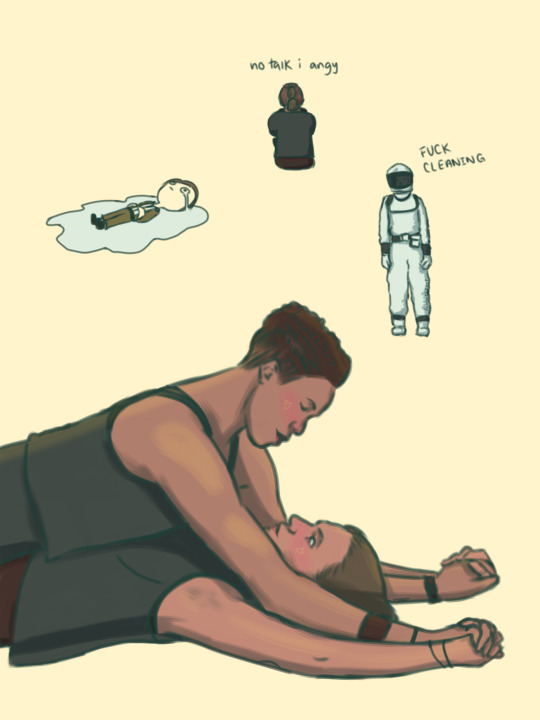
Juliette is very good at hide and seek
#she literally played hide and seek for like two episodes?? lmfao anyways you can imagine shirley found her and tackled her n then they kiss#or idk. idk what to caption this. i have so many thots.#silo#juliette nichols#shirley campbell#rebecca ferguson#remmi milner#hugh howey#silo apple tv#silo series#wool#wtf do i call this show so people can find it#fan art#memes#mytrinkets#jules is so awkward i love her lmao#thinking about rebecca saying how all jules wanna do is probably lie down and cry#of course she would have armpit hair#ignore jules left hand. i cant figure out how their fingers cross n shit#thinking about their matching tattoos <3#I'm gonna read the book cause i just can't stop thinking about rebecca and if i read anything else. I'll hear it in her voice#sapphic#wlw
37 notes
·
View notes
Text
Dear (some in the) Book Community --
You are less than TWO WEEKS away from the release of Onyx Storm. Mere days now, after waiting over a year (if you got Iron Flame back in November 2023) so please tell me this:
What the fuck are you thinking, trying to sneak that copy from the book store that you work at? Or the Amazon warehouse? Or wherever it is you're snagging it?
Because you know what?
You're risking BIG LEGAL TROUBLE. And not just for you, either. But the company you're with, etc.
You're not only risking your job (because I'm sure getting fired is the least of all the consequences) but a book like Onyx Storm is one of those (like Harry Potter was, back in the day, if I remember correctly) where it is literally a DO NOT TOUCH until midnight on release day.
In fact, I know it is. The employee I spoke with at my local BAM back on the midnight release for Iron Flame said it:
"We're not allowed to even cut the box open until it hits midnight."
So all these images that keep popping up of you trying to take home a copy of Onyx Storm?
It's not the "I got it early! Yay me!" that you think.
#onyx storm#rebecca yarros#the empyrean#booklr#books#reading#I'm just like “we're seriously RIGHT at the finish line”#and we've waited over a year#and you're gonna risk the possibility of that store maybe not getting the future books or something#because you couldn't wait 10 fucking days?!#ramblings of a mad woman
14 notes
·
View notes
Text
Crumpets, what are y'all reading? I'm currently making my way through both War & Peace by Leo Tolstoy and Mirrored Heavens by Rebecca Roanhorse, and I fear I'll finish the fun fantasy novel before the Russian epic. Shocking, I know.
Any recommendations, any genre? I'd love to hear about them!!
#war & peace is actually really good but I'm reading it as a study so it's not like a fun sit-down-at-night read#(if it ever could be)#highly reccomend literally everything by rebecca roanhorse that woman is incredible#yapping
19 notes
·
View notes
Text
okay i kind of need to go insane about this rebecca line from book one because it's got me riled up LMAO
so, my f-mancer, flor, has the lowest stats with rebecca, at a whopping 5% so any biting dialogue option at their mom's expense is immediately smashed
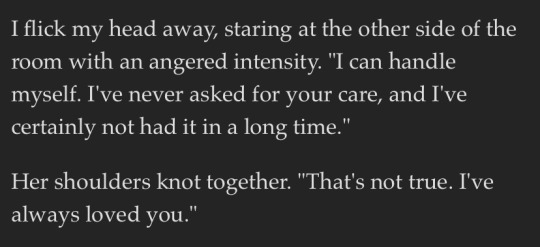
to tell your mother pretty plainly "i'm good. i don't need you. you were never there for me, " and for her to say "that's not true. i've always loved you," is so? indicative of her character imo?
she doesn't listen to the detective even when they're being straight up direct with her – for me, this interaction negates any of the good rebecca's been trying to do, whether or not she thinks she's coming across as genuine in making amends. how are you going to tell your own child that they're wrong? that what they experienced (a childhood full of loneliness, loss, and forced independence) isn't the full story (your mother loved you from afar but never made the conscious effort to show it)?
it doesn't matter if rebecca was out fighting hand-to-hand combat against supernaturals that were trying to take over the world, she was *not* there for the detective. she chose to be an absent mother! that's a fact! no matter the "good" she was doing for mankind
this whole exchange bothers me so much – maybe the writing doesn't exactly line up (that happens with choice based games sometimes, so i get it) but either way it's poor timing, and adds yet another layer to the complexity of rebecca's relationship with the detective
#the wayhaven chronicles#twc#twc rebecca#i have a lot of thoughts but i feel like it's hard to type them all out#i normally pick neutral options or kinda positive ones – sofía is usually willing to be nicer and ramona shrugs it all off#but flor is unwilling to make amends with rebecca – so sometimes rebecca's dialogue can read as very.... weird#i don't necessarily HATE rebecca but... this really makes my skin itch#has me rethinking my approach to my other detectives because i think none of them are destined to have good relationships w her#anyways can you tell i'm prolonging re-reading book 2 <3 i just cannot focus for the life of me man idk#jade plays
243 notes
·
View notes
Text
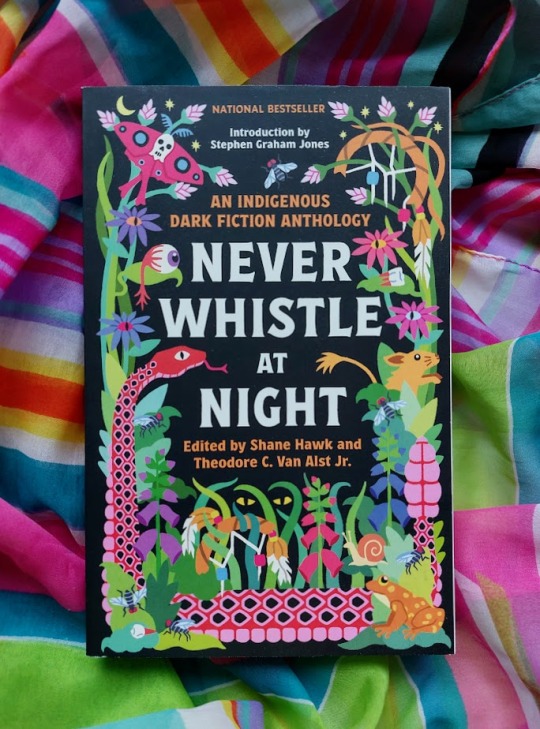
Books of 2024: NEVER WHISTLE AT NIGHT: An Indigenous Dark Fiction Anthology, ed. by Shane Hawk and Theodore C. Van Alst Jr.
This has a bunch of authors I already love in it (Stephen Graham Jones, Darcie Little Badger, Waubgeshig Rice, and Rebecca Roanhorse!!), and several authors I've been meaning to try (like Tommy Orange, Nick Medina, and Kelli Jo Ford, to name a few), so I'm really hyped for them all to be together in one volume! Plus dark fiction is very much my jam (especially when it comes in a bright and colorful package).
#books of 2024#books#book photography#never whistle at night#never whistle at night: an indigenous dark fiction anthology#shane hawk#theodore c. van alst jr.#stephen graham jones#rebecca roanhorse#darcie little badger#waubgeshig rice#i'm sorry i'm not tagging ALL of them lol there are twenty-six (26) stories in here and i do not have the attention span for that many name#i love all the details on the cover too!!#the longer i look at it the more i find#full disclosure: i did in fact used to whistle at night because i don't want to startle creachers directly into my face when i take out--#--the trash or nocturnally shovel snow but uh. i have stopped doing that. since this book hit my shelf lol#(also sorry i just now noticed that the detached human eyeball is PURPLE of all things)#(driscoll posting)#(yeah this was vaguely in the driscoll lineup too#that's where it's been living on my shelf in the meantime)#(right next to OTHER TERRORS lol)#driscoll#in btw#anyway ignore this next text post i'm about to make pretend i'm reading this#and/or doing my damn taxes
29 notes
·
View notes
Text
*carefully adds serapio from black sun by rebecca roanhorse to the list of bird-themed men in fantasy novels that i love a lot*
#i'm about halfway through black sun and it's so good!!#and serapio is so interesting#love a character destined to become an avatar of a god…#pie says stuff#pie reads#blacksun#between earth and sky#serapio#rebecca roanhorse#books#the other bird men are of course bloodraven from asoiaf and kathe from swords and fire
19 notes
·
View notes
Text
for the results of everyone's favorite season one insults, see here!
#ted lasso polls#my polls#ted lasso#SHE'S HERE. I've had this in my drafts all season rewatch. slowly adding to it.#and man are there some hidden gems this season#like the jamie ones and the roy ones are iconic and many#but rebecca's mother didn't need to read ted for filth like that...#and SASSY. Sassy at the funeral my beloved my precious#not to mention that there's something so special about keeley jones calling rupert's baby whack#i'm cupping her in the palms of my hands#i deliberately left out the nate ones because they're SO mean and personal they make me feel sad.#but if you like insults that are incredibly sinister i have added that other option just for you <3#go forth and support your fav's rights and wrongs!
64 notes
·
View notes